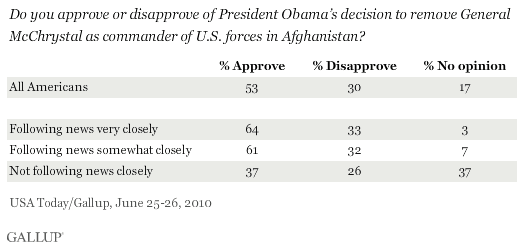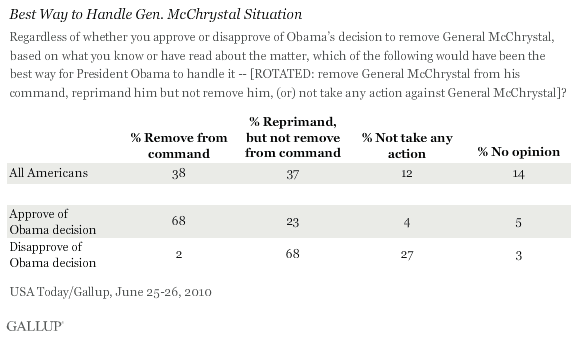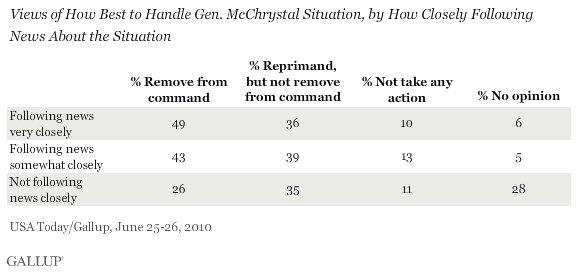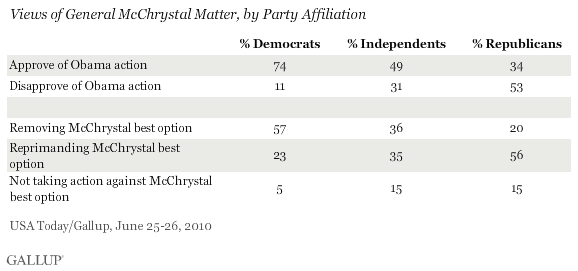PRINCETON, NJ -- A new USA Today/Gallup poll finds a majority of Americans approving of President Obama's decision to remove Gen. Stanley McChrystal as commander of U.S. forces in Afghanistan. Those who say they are following news of the story "very" or "somewhat closely" approve by close to a 2-to-1 margin.

The poll was conducted June 25-26, just days after Obama announced he was relieving McChrystal of his duties. Earlier in the week, a Rolling Stone magazine article quoted McChrystal and his aides making disparaging comments about members of the Obama administration. Sixty-three percent of Americans say they are following the news of the story closely, including 28% who say very closely.
Though most Americans approve of Obama's decision to oust McChrystal, they don't necessarily agree that removing the general from his duties was the best way to handle the matter. Specifically, 37% say Obama ideally would have reprimanded McChrystal but not removed him from his command, about the same as the proportion who say removing McChrystal was the best way to handle the situation (38%). Another 12% say Obama should not have taken any action against McChrystal. Fourteen percent do not express an opinion.
The vast majority (68%) of those who approve of Obama's decision agree that removing McChrystal was the best way to handle the matter. Still, more than one-quarter of this group believe a lesser punishment would have been a better course of action. Those who disapprove of Obama's ouster of McChrystal would generally have preferred that the president reprimand the general.

The more closely Americans are following the story, the more likely they are to view dismissing McChrystal as the best way to handle the situation.

The relationship between paying greater attention to the story and a greater likelihood of believing McChrystal's removal was the best option is not merely a function of partisanship. Democrats (31%) and Republicans (29%) are about equally likely to be following the story very closely.
Partisan Differences
Seventy-four percent of Democrats approve of Obama's decision to remove McChrystal as U.S. commander in Afghanistan, compared with 49% of independents and 34% of Republicans.
Though more than 7 in 10 Democrats approve of Obama's actions, significantly fewer, but still a majority (57%), say removing McChrystal would have been the best way to handle the matter. Most Republicans would have preferred a lesser punishment for McChrystal, with 56% preferring a reprimand.

Bottom Line
Americans generally back President Obama's decision to remove Gen. McChrystal from his position as the U.S. military commander in Afghanistan, even though a significant proportion of those who approve of Obama's action say a less severe course of action such as a reprimand would have been better. It is telling, though, that Americans who are closely following the story back the president by rather solid margins and show a greater tendency to believe that dismissing McChrystal was the best way to handle the matter.
Survey Methods
Results for this USA Today/Gallup poll are based on telephone interviews conducted June 25-26, 2010, on the Gallup Daily tracking survey, with a random sample of 1,044 adults, aged 18 and older, living in the continental U.S., selected using random-digit-dial sampling.
For results based on the total sample of national adults, one can say with 95% confidence that the maximum margin of sampling error is ±4 percentage points.
Interviews are conducted with respondents on landline telephones (for respondents with a landline telephone) and cellular phones (for respondents who are cell phone-only). Each sample includes a minimum quota of 150 cell phone-only respondents and 850 landline respondents, with additional minimum quotas among landline respondents for gender within region. Landline respondents are chosen at random within each household on the basis of which member had the most recent birthday.
Samples are weighted by gender, age, race, education, region, and phone lines. Demographic weighting targets are based on the March 2009 Current Population Survey figures for the aged 18 and older non-institutionalized population living in continental U.S. telephone households. All reported margins of sampling error include the computed design effects for weighting and sample design.
In addition to sampling error, question wording and practical difficulties in conducting surveys can introduce error or bias into the findings of public opinion polls.
View methodology, full question results, and trend data.
For more details on Gallup's polling methodology, visit https://www.gallup.com/.
